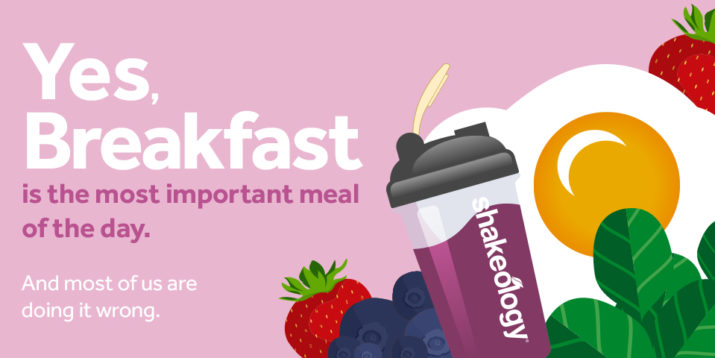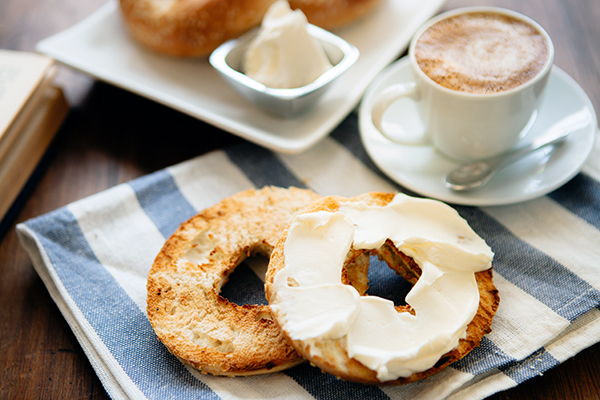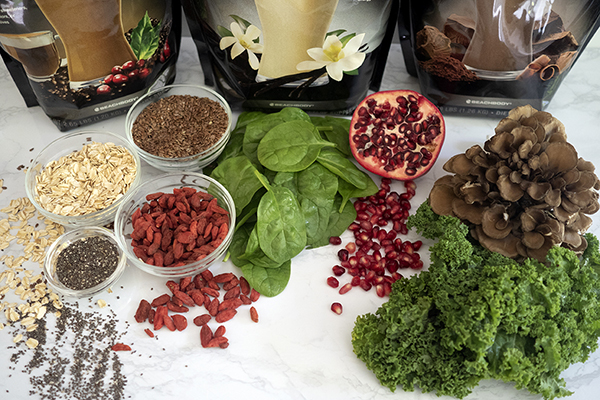Why Breakfast Really Does Matter – But Only If You’re Doing It Right

If you’re like most of us, your mornings are a mad dash for the door, scrambling to get you and possibly family members off to work or school.
Breakfast likely consists of coffee and whatever quick bite you can stuff in your face, like a granola bar or a muffin — if you eat breakfast at all.
However, a growing body of research shows that what you eat when you wake up could greatly impact the course of your entire day.
If you want to wake up, feel energized, and take on the day, coffee can help you get out the door, but it’s a balanced breakfast that will set you up for the rest of the day.
According to researcher Heather Leidy, Ph.D., associate professor of nutritional sciences and pediatrics at the University of Texas, Austin, who studies the impact of meal-timing on the body, that first meal of the day — and specifically, what’s in it — is critical to curb hunger, reduce food cravings, and maintain better blood sugar control to prevent those “hangry” feelings throughout the day.
And, it turns out, most people are doing breakfast all wrong.
Ahead, the impressive benefits of breakfast; what a balanced, healthy breakfast looks like; plus, what recent studies downplaying the importance of breakfast are missing.
4 Benefits of a Balanced Breakfast

Did you know that the old bromide of breakfast being “the most important meal of the day” was actually coined by the Kellogg’s brand as a way to sell more cereal?
Given its origin, you might think there’s little truth to it.
However, several independent studies since have shown that a quality breakfast comes with a host of benefits.
“There’s strong evidence supporting breakfast for satiety, metabolism, cognitive performance, and diet quality,” says Leidy.
Meaning, it’ll help you perform like a boss and allow you to make smarter food decisions throughout the day.
To reap the benefits of breakfast, however, quality is key, Leidy says.
And most people aren’t getting the optimal amount of nutrients to help them power through the day, she explains.
What does a quality breakfast look like?
One that’s balanced, nutrient-dense, high in protein and fiber, and isn’t loaded with added sugar.
Research shows that this kind of balanced, protein- and fiber-rich breakfast can help:
- You snack less and eat fewer sugary foods throughout the day
- Fill you up and keep you full for longer
- Reduce your overall daily food intake
- Support cognitive function and performance, compared to skipping breakfast
“Eating a high-protein breakfast allows you to adhere to a healthier diet and helps you make better food choices throughout the day,” says Leidy.
What Are People Actually Eating for Breakfast?

Despite these findings, the number of people who consider breakfast critical is shrinking.
A 2018 study shows that nearly one in five Americans regularly skip breakfast.
Canadians don’t fare much better: A 2005 Ipsos poll found 28% don’t regularly eat a balanced breakfast during the workweek and 34% say they skip breakfast at least once a week.
And adults who do eat breakfast aren’t choosing the type of high-protein breakfast that helps promote better eating habits.
Rather than a high-protein breakfast, a high proportion of calories goes to carbohydrates and sugar.
“People are still eating a lot of sugar in the morning, and people are getting a lot of sugar from so-called healthy breakfasts,” explains Leidy.
According to Krista Maguire, R.D., C.S.S.D., and nutrition manager at Beachbody, eating a breakfast full of sugar or refined carbohydrates is a surefire way to run out of steam quickly.
“Starting your morning with simple carbs like sugary cereal, muffins, donuts, or other baked goods sets you up for a vicious cycle of energy highs and lows,” she says.
And when energy levels crash, your body can react with cravings for more sugary foods, explains Maguire, setting off a cycle of slumps and snacking.
“A high-protein, high-fiber breakfast helps maintain healthy blood sugar levels and provides a steady stream of energy, which can keep hunger at bay and prevent those mid-morning or mid-afternoon energy slumps,” she says.
Why Do Some Studies Say Breakfast Doesn’t Matter?
Instead of the most important, breakfast might now be considered the most contentious meal of the day.
In the past few years, a handful of studies have come out saying that breakfast is optional at best, and one suggested breakfast may even hurt weight loss efforts.[1]
According to Leidy, who has read almost every study that’s been done on breakfast, these studies have a major flaw: They don’t take into account the quality of people’s breakfasts or assess what they were eating.
In other words, doughnuts, muffins, and other sugary options are lumped together with healthier breakfast foods.
If you’re comparing cereal and juice or a bear claw to skipping breakfast, you won’t see any overall health benefits of eating breakfast versus not.
Related: Do You Really Need to Eat Breakfast to Lose Weight?
“Over the past five years, there have been several articles concluding that breakfast doesn’t matter. But if you read those studies, the authors clearly state that they didn’t assess macronutrient content or breakfast quality,” explains Leidy. “While we cannot say that breakfast, in general, is beneficial, we can support that eating a nutritious breakfast is extremely beneficial.”
“When you actually start looking at the quality of the breakfast, you see that a higher-protein breakfast helps prevent food cravings and decreases hunger. And that those people eat fewer snacks and sweets, especially later in the day,” she adds.
Related: 6 Habits of People Who Successfully Maintain Weight Loss
And in fact, research shows that among people who lose a significant amount of weight and keep it off, 78 percent eat breakfast every day.
How to Eat a Breakfast That Supercharges Your Day

It’s not that most people want to eat a bad breakfast.
A 2018 Mintel market report finds that a lot of us are simply too time-strapped to really think about what we’re going to eat to fuel our mornings, and instead rely on convenience.
And in fact, people are seeking out healthier, protein-rich options — as long as they’re quick and portable.
Unfortunately, many grab-and-go breakfast options don’t contain all the fiber, protein, and other nutrients you’d be getting in an ideal, sit-down scenario.
Or, they’re surprisingly high in added sugar.
Related: 4 Common Breakfast Mistakes and What to Eat Instead
That’s one of the reasons why Shakeology was born. It’s a convenient, nutrient-dense, and protein-rich way to start your day.
High in protein and fiber, but not in added sugar, Shakeology can be a delicious and easy way to add these nutrients and more to a balanced breakfast.
It has potent superfoods and botanicals; provides healthy energy; and is a nutrient-dense way to start your day.
When you drink Shakeology each morning as part of a healthy breakfast, you’re setting yourself up for success for the rest of the day.
For inspiration on how to whip up the perfect shake to start your day in no time flat, check out these tasty Shakeology recipes.

